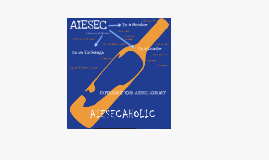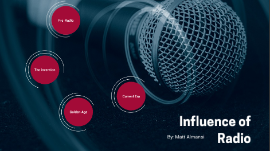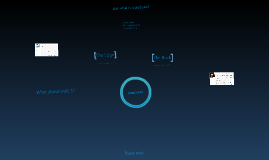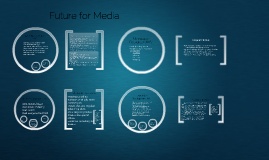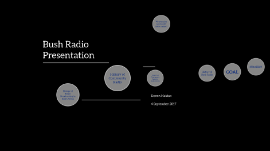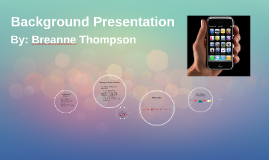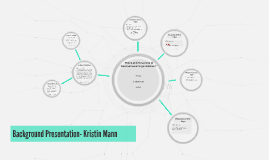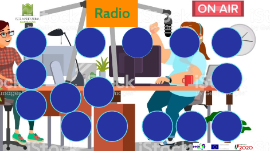Radio Presentation
Transcript: Radio Work performed by: Guilherme Pires – nº6 – 11º R/B A Rafael Pires – nº10 – 11º R/B A Ana Beatriz – nº1 – 11º R/B A Ana Manuel – nº1 – 11º C/P A The first broadcasting experiences were made by Marconi in 1894. In Portugal, in the year 1923 was created the portuguese society of amateurs wireless telephony, forerunner of the radios of today. In Portugal the experiences with this new medium began in the 20s of the last century. In 1935 was born the national broadcasting broadcaster, current Antena 1. A year later, the experimental emissions of radio renaissance began. After the revolution of 25 April 1974, all radios in Portugal are nationalized, with the exception of Radio Renascença. In 1976 the national broadcaster is called Radio Diffusion Portuguesa (RDP).Since then many other radios have been created in Portugal, and have also been occupying an important place in Internet broadcasts. 1894-first antenna created; 1899-first connection that crosses the channel stain. 1901-First experiences with wireless telegraphy in Portugal. 1906-First trans-Atlantic transmission. 1908-First Call with voice. 1912-government contact with the Marconi campaign. 1923-The Portuguese Society of Amateurs of wireless telephony (T.S. F) is founded 1933-The first radiophilic associations are born. 1935-The National radio station (current Antenna 1) is born. 1936-Experimental broadcasts of Radio Renascença. 1974-"And After the Farewell" and "Grândola Vila Morena" pass on the radio. 1975-The radios in Portugal are nationalized, with the exception of Radio Renascença. 1976-The national broadcaster is now called Radio Diffusion Portuguesa (RDP). Antenna 2 is created. 1977-The "Pirate radios" propagate in Portugal. 1987-RFM inaugurated. 1988-Start of regular emissions from TSF. 1994-Antena 3 is born. 1998-The Internet radios are vulgarized. Finaly years 80-legalized pirate radios. 2011-Antena 3 launches two new online radios: Rock and dance. http://ensina.rtp.pt/artigo/a-historia-da-radio/ The history of radio has undergone several processes to date, one of the first processes was performed by Michael Faraday when he discovered, in England, the principle of electromagnetic induction in 1831. In Scotland, in 1863, James Clerk Maxwell mathematically demonstrated the probable existence of electromagnetic waves reinforcing the theory of other scientist. In Germany in 1887, a device where the displacement and sparks were checked through the air, thus achieving electric power between two points without using wires. In this way Hertz proved, experimentally Maxwell's theory, that electricity travels from the atmosphere in wave form, also verified that these waves were moving at the speed of light. Later, the first radio system was invented by Nikola Tesla, who greatly contributed to the discovery of the radio from a practical and experimental point of view. In 1894, Guglielmo Marconi, in order to improve the radio system, built a receiving antenna that captured signs of Morse alphabet. In 1896 Marconi demonstrated the run of its emission and receptions devices in England. Oliver Lodge in England and Ernest Branly in France invented the coesor, a device that improved the detection of waves. Oliver Lodge sometime after inventing the coesor, invented the tuned electrical, which allows the change of station, and selects the desired frequence. Butit was possible with the appearance of the three-element valve, called the triode, which was developed by Lee de Forest in the USA in 1906. In 1919 it also emerged the microphone, through the amplification of the characteristics od the nozzle of the phone, performed by engineers of the westinhouse factory. His project was continued and developed by Américo dos Santos who founded the first radio, with the name of Radio Grace, in Lisbon. In May 1930 the port was carried the first station in the north, called Sound radio. In the second world War, the radio took on an important role, being the only means of communication that could reach everyone. In wartime and with the houses destroyed, the radio was the cheapest way for citizens to obtain information about the state of war. In RFM you can hear "RFM emission online"; RFM eighty ";" RFM THE ROCK "; "RFM DANCEFLOOR"; "RFM PACIFIC OCEAN". The frequencies of RFM in Santarém, Portugal are: 91.7 FM (ninety-one score seven) 93.2 FM (ninety-three score two) 101.1 FM (one hundred one score one) 106.8 FM (one hundred six score eight) RFM talks about: Information Weather Traffic On the RFM website there is the option of podcasts. Podcasts is where listeners can hear songs they haven't heard during the day or want to hear again. The Top twenty-five of the RFM is the list of songs preferred by the Portuguese. You can vote on the songs we want to hear on Sunday between 18p.m. and 20p.m.. RfM programs are: Breakfast – Open during the week from 7am to 10am. José Coimbra – Open during the week from 10am to 13p.m My boss is cool – Friday from 10am and last all weekend. You






